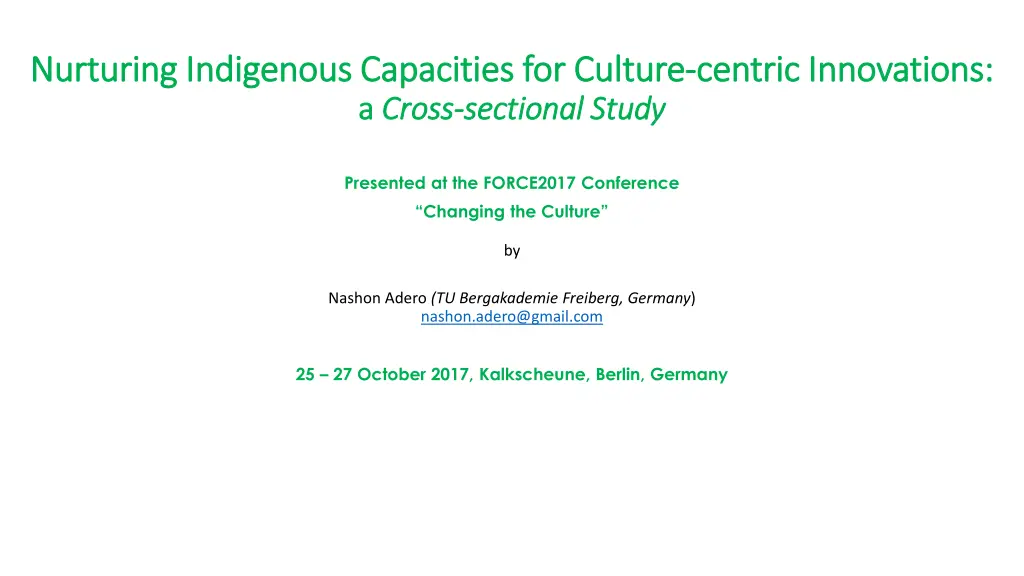
Nurturing Indigenous Capacities for Culture-Centric Innovations
Explore the importance of nurturing indigenous capacities for culture-centric innovations in education, highlighting the challenges faced and potential solutions for enhancing innovation potential. The study delves into the impact of training emphasis on innovation across different countries, shedding light on the skewed priorities that hinder progress.
Download Presentation

Please find below an Image/Link to download the presentation.
The content on the website is provided AS IS for your information and personal use only. It may not be sold, licensed, or shared on other websites without obtaining consent from the author. If you encounter any issues during the download, it is possible that the publisher has removed the file from their server.
You are allowed to download the files provided on this website for personal or commercial use, subject to the condition that they are used lawfully. All files are the property of their respective owners.
The content on the website is provided AS IS for your information and personal use only. It may not be sold, licensed, or shared on other websites without obtaining consent from the author.
E N D
Presentation Transcript
Nurturing Indigenous Capacities for Culture Nurturing Indigenous Capacities for Culture- -centric Innovations: a a Cross Cross- -sectional Study sectional Study centric Innovations: Presented at the FORCE2017 Conference Changing the Culture by Nashon Adero (TU Bergakademie Freiberg, Germany) nashon.adero@gmail.com 25 27 October 2017, Kalkscheune, Berlin, Germany
Changing the Culture: Talents, Training, Nurturing Innovation Do indigenous factors receive proper emphasis in basic education? Socialisation & Management of Pedagogy: Nurturing innovation and leadership talents, attitudes Cultural idiosyncrasies: cross-country experiences Technological innovation capacity remains the primary engine for wealth creation Legacy thinking vs. legacy systems and colonial relics New Era: Future of work and scholarship
The Problem: Skewed emphasis within static systems Are socio-cultural and environmental settings part of education policy? Innovation capacities can suffer due to: Skewed training emphasis during the formative years Processes lacking incentives for curious discovery Education as the borderless currency for transferrable influence in the global village Ineffective communication management Copy-cuts without adequate contextual adaptation
Cross-Country Survey: Education and Skills for Innovation 36 key informants drawn from various continents 1. Literacy 2. Numeracy Online survey on 8 skills in basic education: STEM education invites much curiosity in educational policy agenda (Next Einstein Forum, Dakar, 2016) 3. Communication skills 4. Creative arts 5. Spatial intelligence 5. Scientific inquiry 7. Systems Thinking 8. Talent management
Weighted Average Results on 100% Scale: 2014 - 2015 Innovation potential (x) vs. Training emphasis (y) Countries of respondents: Skewed priorities in training emphasis, especially for responses from Africa 1. Kenya 2. Tanzania 3. Burundi 4. Indonesia 5. China 6. Brazil 7. Germany 8. Britain 9. USA
Results (1/7) Asia: Examples help learners develop problem-solving skills through games and puzzles. Break-away sessions extend the critical-thinking capability of learners beyond the classroom USA and Europe: Basic education curricula expose students to learning by self-discovery and map-reading skills as part of developing spatial intelligence
Results (2/7) Extra-curricular activities outside classroom recommended for developing spatial intelligence, seeing the big picture, and scientific inquiry Kenya: exam-oriented training a key characteristic of the education system students right from primary school, thereby suppressing the freedom of creative thought and imagination
Results (3/7) In urban settings, learners lack meaningful interaction with the environment that can offer natural lessons through role playing, seeing live examples, and applying numeracy skills to real-life In deciding which courses to pursue at higher learning institutions (college/university), the cost of the programme was among the leading factors students in Kenya consider
Results (4/7) Acquiring skills for employment outweighed acquiring skills for self- employment as a factor Kenyan students consider when choosing training programmes The influence of mentors a significant factor Objective position reflected in the weighted average from the worldwide survey placed the highest value on acquiring skills for self- employment (83%)
Results (5/7) Reputation of the college/university (76%); technology and innovation opportunities offered by the recommendation by mentors (74%) training programme (74%); Peer influence the least at 43% Basic education curriculum places more emphasis on developing literacy and numeracy skills, at 83% and 75% respectively. The two were the lowest rated in boosting innovation
Results (6/7) The worst casualties of neglect in training emphasis are systems thinking (14%), talent management (19%) and scientific inquiry (25%) Spatial intelligence (31%) and creative arts (36%) are also still below the required level of training emphasis
Results (7/7) Scientific inquiry scored 94% as the most important attribute for innovation capacity, followed by systems thinking skills (91%) and talent management (88%) Communication skills (86%), spatial intelligence (85%) and creative arts (83%) also exert their high importance in innovation capacity
Way Forward Reorient basic education priorities, contextualise delivery of training within local social, cultural and environmental settings Retrain educators for new delivery skills; students to be motivated through results-based outcomes with profound impact on their esteem for intellectualism
Intellectuals should network to form a branded critical force of proactive thinkers/problem solvers, grab strategic opportunities towards gaining positions in key policy decisions as thematic leaders. Nurture thinkers, right from primary school, through talent identification, performance tracking beyond written exams, and structured cross-country mentorship and leadership challenges.
END Statement on the future of work and scholarship: Education is the borderless currency for impacting the world. The future of work requires a people with creative, flexible and transferrable skill sets. Open knowledge-sharing platforms can only accelerate the outcomes.






















